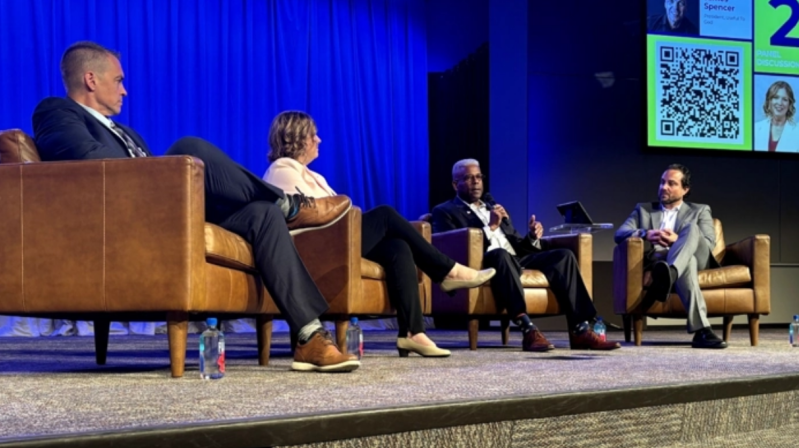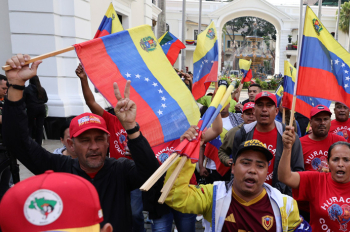
How should American Christians respond as accusations of "Christian nationalism" increasingly fly toward people of faith who try to participate in politics?
During a multi-panel event this week moderated by Christian Post reporter and podcaster Ian Giatti as an extension of CP's "Politics in the Pews" podcast and article series, Lt. Col. Allen West (Ret.), Christians Engaged founder Bunni Pounds and theologian James Spencer, Ph.D., weighed in on the hot-button issue, which they believe to be an attempt to intimidate Evangelicals out of the political process.
"This whole thing about Christian nationalism [is that it] basically wants us to admit that America is not fundamentally a Judeo-Christian faith heritage nation," said West, who rose to national prominence amid the Tea Party movement when he first ran for Congress in 2008, won a seat as a Florida congressman in 2010 and later became chairman of the Texas GOP from 2020 to 2021.
Belief in God, West said, is intrinsic to American government. He traced the ideas of founders such as Thomas Jefferson to the thought of 17th-century English political philosopher John Locke, who emphasized the theory of God-given natural rights.
West said Locke's ideas, which echoed in the opening sentences of Jefferson's Declaration of Independence, are now under attack by those who seek to assign the Christian nationalism label to their political opposition.
"There is no other nation in the world that has been established on the premise that your individual rights are endowed to you by the Creator God," he said. "Now all of a sudden, if you start talking about natural rights theory, if you start talking about these things that are fundamental to the United States of America [...], you're a Christian nationalist."
"So, in other words, you're not allowed to believe that your rights are endowed to you by God. You're not allowed to love God and country," West continued, adding that the U.S. Constitution, to which he took an oath as an officer in the U.S. military, separated the federal government into three branches based on Isaiah 33:22.
D.L. Moody Center President James Spencer agreed with the other panelists but also stressed the need to maintain a distance between Christianity and the state.
"When I look at Christian nationalism, one of the dangers that I see is the inappropriate merger of Christianity with politics," said Spencer, who most recently wrote the book Serpents and Doves: Christians, Politics, and the Art of Bearing Witness.
"And I do think that there needs to be a distinction between the church and the state," he continued. "Not a separation in the sense that we often hear about it today, but more in the sense that Roger Williams wrote about in the mid-1600s, where he's talking about the wonderful garden of the Church being separated from the wilderness of the world. We have to make sure that we maintain that separation."
"I want to make sure that the Church is still worshiping the triune God, that we are still pointing to and glorifying the triune God, and that as our primary trajectory, and that we are not surrendering ourselves over to a religion of American politics," he added.
Spencer said his primary concern "is just to make sure that while we're engaging in politics, we're doing so as an act of discipleship, as opposed to allowing the politics to drive our discipleship."
'The left has created a religion of their own'
West suggested that the Christian nationalism discussion has emerged because "the left has created a religion of their own," predicated on doctrines such as abortion and climate change, which he said is antithetical to the Jeffersonian ideal of maintaining a separation between church and state.
"So they have created these things, and if you don't go with it, you don't agree with it, then you're an extremist," he said, making special mention of Politico reporter Heidi Przybyla's comments during an MSNBC panel in February that slapped the "Christian nationalist" label on those who believe rights "don't come from Congress, they don't come from the Supreme Court, they come from God."
"So, yeah, I'm a Christian nationalist," West said. "What are you going to do about it? I'm going to go on offense. I'm not going to sit back and let these people demonize me and attack me when what I stand on is the fundamentals of this country."
Bunni Pounds, who served for 16 years as a political consultant to members of Congress before starting Christians Engaged, suggested that the Christian nationalism label has arisen out of ignorance and a desire to instill fear.
"We get labeled stuff because people don't understand us," she said, noting how a 2021 study led by respected Evangelical pollster George Barna showed that only 6% of Americans have a biblical worldview.
Pounds said that Christian elected officials need prayer and support and that the Christian nationalist label is intended to push Christians into shirking their civic duty to engage.
"They need believers blockwalking and adopting candidates and funding them and helping them," she said of Christian candidates and officials. "But oh, if you give money or you volunteer for a candidate, you're now a Christian nationalist. It's ridiculous."
"In essence, what they're trying to do is put fear on you, so that you do not engage," she added. "And let me just break that fear off of you right now. Fear cannot have a hold on us as believers, and we need to actively be praying and interceding, voting in every election and engaging for America. Don't let them label you."
'None of the other Christians get labeled anything'
While conservative Evangelical Christians are made to feel they have to keep politics out of their churches, Pounds noted how the liberals are utilizing churches for their political purposes.
"We are always talking about Evangelical right and us getting out the vote around our pro-family, pro-life values, but we're not having conversations about the progressive Left using churches to activate Christian voters," she said.
Pounds stated that she was recently sent a handbook from a prominent black Pentecostal denomination that showed "how to mobilize their church with bulletin inserts, email copy, everything that the pastor needs to do, even sermon notes."
"So the Christian nationalism label gets labeled on Evangelical, Bible-believing Christians who are pro-life and pro-family, and none of the other Christians get labeled anything," she said. "And so that's, that's the issue, right? We're not talking about them mobilizing voters, but we're getting labeled for our voter mobilization effort."
After she remembered how a video of Vice President Kamala Harris endorsing Terry McAuliffe for governor circulated in hundreds of Virginia churches in 2021, West jumped in, joking, "Bunni, I think you should do what Hillary Clinton did and go around to the black churches and say, 'I don't feel noways tired.'"
Editors' note: This is part 12 of The Christian Post's year-long articles series "Politics in the Pews: Evangelical Christian engagement in elections from the Moral Majority to today." In this series, we will look at issues pertaining to election integrity and new ways of getting out the vote, including churches participating in ballot collection. We'll also look at issues Evangelicals say matter most to them ahead of the presidential election and the political engagement of diverse groups, politically and ethnically. Read part 1, part 2, part 3, part 4, part 5, part 6, part 7, part 8, part 9, part 10 and part 11 at the links provided.
Originally published by The Christian Post





